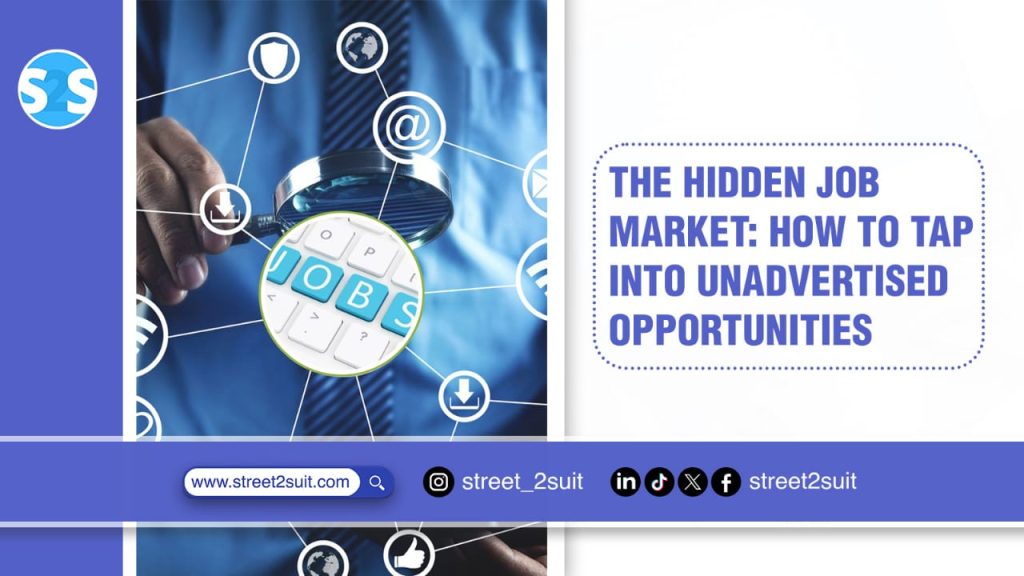Without becoming a Spy in a hidden job market, picture this: You’re hunched over your laptop, eyes squinting from too many hours on job boards. You’ve scrolled past the same “entry-level role that requires 5 years’ experience” listings, and your resume has been uploaded so many times you’re starting to feel like a contestant on Upload Idol.
Yet somehow, you keep hearing about people landing amazing jobs that you’ve never seen advertised.
Enter the mystical realm of… The Hidden Job Market.
Sounds like the title of a Nicholas Cage movie, doesn’t it? Don’t worry—there are no ancient maps or national treasures involved. But there is treasure… in the form of job opportunities that are never posted publicly.
Yes, it’s real. Yes, it’s powerful. And yes, you can tap into it—no trench coat or decoder ring is required.
Let’s dive into the not-so-secret strategies for uncovering these secret squirrel job opportunities (with a healthy dose of wit and wisdom along the way).
What Is the Hidden Job Market Anyway?
Contrary to what you might think, the hidden job market isn’t located behind a bookshelf or protected by riddles.
It refers to jobs that are not publicly advertised. These roles are filled through:
- Referrals
- Internal promotions
- Recruiter outreach
- Networking (cue dramatic music)
- Insider knowledge (because sometimes, it is about who you know)
Studies suggest that anywhere from 50% to 80% of job openings are never posted. That’s right—most of the job pool is like an iceberg. You’re just seeing the tip while the real action is happening beneath the surface.
Why Do Companies Keep Jobs Hidden Like It’s a Game of Hide-and-Seek?
Great question, Dauda.
Here’s why many companies don’t post all their job openings:
1. They Want Referrals
People trust people. Hiring managers prefer candidates who come recommended. It’s less risky than picking a stranger from the résumé lottery.
2. It Saves Time and Money
Posting a job means sifting through 300 applications from people who “sort of” read the job description. Referrals and internal hires save HR a therapy bill.
3. The Job Isn’t Fully Defined Yet
Sometimes a company knows they need someone, but not exactly who or what the role will be. So, they quietly float the idea around networks.
4. Internal Candidates
The role may be reserved for someone already inside the company, but HR still wants to pretend they’re being democratic.
How to Tap Into the Hidden Job Market (Without Breaking into a Sweat)
Now that you know the hidden job market exists, let’s uncover how you can dig in—and get hired.
1. Network Like a Human, Not a Robot
Let’s get this out of the way: networking isn’t just about showing up to events and pretending to enjoy dry pastries.
It’s about building real relationships.
Start by:
- Reaching out to former colleagues
- Attending industry events or webinars
- Chatting with alumni from your school
- Joining professional groups on LinkedIn or Facebook (yes, even that Facebook)
Tip: Don’t open a conversation with “Hi, I’m job hunting.” That’s like walking into a party yelling, “I need a kidney!” Instead, start with curiosity: ask about their work, and their career path, and—when the moment’s right—mention you’re exploring new opportunities.
People help those they like, not those who interrogate them like it’s a customs interview.
2. Be Loud (But Not Obnoxious) on LinkedIn
LinkedIn is a professional cocktail party where no one’s drunk (we hope).
To get noticed:
- Update your profile with keywords relevant to your dream role.
- Share thoughtful content about your industry.
- Comment on others’ posts like a decent human.
- Post about your learning journey, skills, and even job search (but again—without sounding desperate).
People are watching—even if they don’t always comment. The more visible you are, the more likely someone will reach out with “Hey, we have an opening you might like…”
Boom. Hidden job. Found.
3. Informational Interviews: AKA Legal Career Snooping
Want to know how people got their jobs?
- Ask them
- Set up informal chats (10–15 minutes) with professionals in your target field. Don’t beg for a job—just learn from them. Ask:
- “What does a typical day look like?”
- “How did you get your foot in the door?”
- “What advice would you give someone trying to enter this field?”
People love talking about themselves. And once they like you, they may think of you when their company is hiring.
Bonus: You might also get invited to apply before a job is ever posted.
4. Make Recruiters Your New Best Friends
Recruiters are like talent scouts—if they believe in you, they’ll pitch you to employers. Reach out to ones in your industry with a friendly message and your résumé.
No ghosting, though. Keep in touch now and then, even when you’re not actively job-hunting. Send them a meme. Or maybe just an update about your skills.
Recruiters also know about jobs before the public does—like psychic job fairies with LinkedIn Premium.
5. Volunteer, Freelance, Intern—AKA Trojan Horse Your Way In
If you’re struggling to land a full-time role, consider other creative entrances:
- Volunteer in organizations relevant to your field
- Take on freelance gigs
- Offer to help with a project part-time
Once you’re inside, people see your value, and voilà! A role might be created just for you.
Think of it as dating your dream job before going steady.
6. Tap Into Alumni Networks and Industry Associations
These are often underused gold mines.
Your school’s alumni network probably has people in high places—people who are secretly willing to help someone who knows the mascot’s name and school anthem.
Also, join relevant associations. Many have job boards or insider emails listing roles you’ll never find on Indeed.
7. Follow Companies, Not Just Jobs
You don’t always need to follow the job listing—follow the company instead.
- Make a list of your dream organizations and keep tabs on them:
- Follow their pages on LinkedIn
- Sign up for company newsletters
- Engage with their social media content
- Stalk their careers page like it owes you money
If you see a department growing or someone leaving, reach out with a smart, timely pitch: “I noticed your team is expanding. I’d love to be considered if a role opens up.” Sometimes being early beats being perfect.
Common Mistakes to Avoid (Because We’re Friends and I Care)
- Sending the same message to 200 people – People can smell copy-paste from a mile away. Customize.
- Being vague – Don’t say “I’m open to anything.” Be specific, or you’ll get recommended for llama grooming in Peru.
- Ghosting after help – Always thank people, follow up, and keep them updated.
- Ignoring your current network – You don’t need a celebrity mentor. Your cousin’s friend’s aunt might be the one to get you in the door.
Conclusion
Become a Hidden Job Market Detective.
Tapping into the hidden job market isn’t magic—it’s strategy, persistence, and a sprinkle of personality.
So, if the job boards are making you weep into your coffee, look beyond them. The best roles might be hiding in plain sight—waiting for someone just like you to knock.
Network smart. Stay visible. Ask bold questions. Be curious. And remember: the hidden job market isn’t hidden—it’s just waiting for you to show up with the right flashlight (and maybe a well-written LinkedIn post).
Now go forth and find those “invisible” jobs. And if you become the office hero who found a role that was never posted, just remember to send me a virtual high-five.
Receive the latest job and career updates in your inbox, every week!




